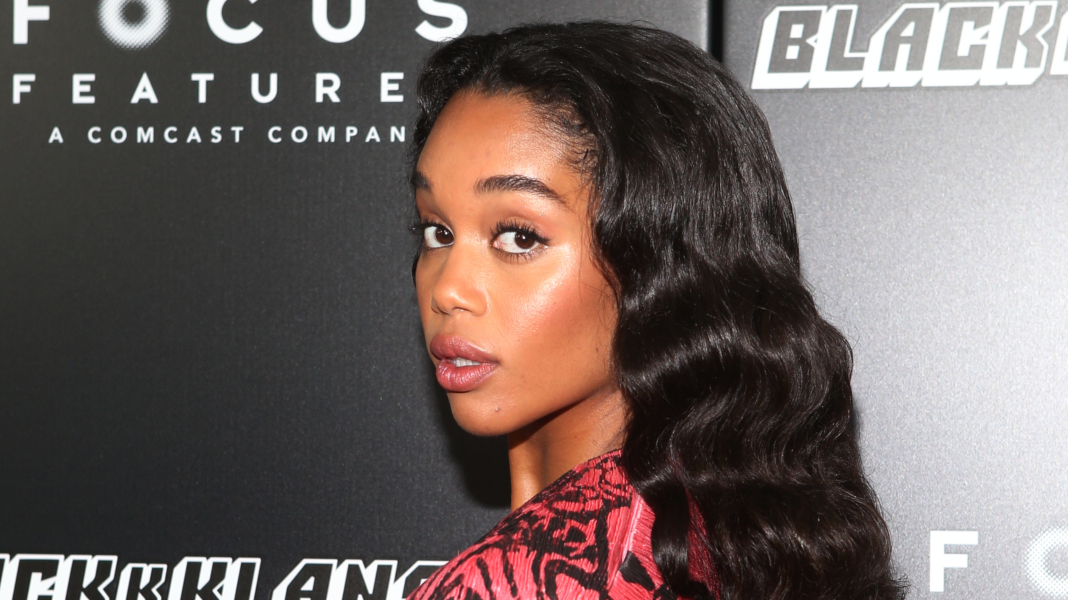Laura Harrier: Colorism Is Why Many Women On-Screen Now Are Biracial
<em>BlacKkKlansman</em>‘s Laura Harrier Says Colorism Is Reason So Many Women Working In Hollywood Now Are Biracial
Share the post
Share this link via
Or copy link

Laura Harrier
Where: New York, New York, United States
When: 30 Jul 2018
Credit: Derrick Salters/WENN.com
Amandla Stenberg. Yara Shahidi. Zendaya Coleman. Zazie Beetz. Alexandra Shipp. Kiersey Clemons. Laura Harrier.
Three things they have in common is that they are all young, have all starred in big film and TV projects recently (multiple for everyone mentioned), and they’re who people say is up next in Hollywood.
Oh, they’re also all biracial.
A number of these women have talked about the ways in which they believe their domination in terms of visibility on-screen should change. Stenberg spoke about backing out of auditions for Black Panther because she realized “there are spaces that I should not take up.” Coleman also recently said of Black girls, “We’re vastly too beautiful and too interesting for me to be the only representation of that.”
And now, Harrier, who most recently starred as a biracial teen in Spider-Man: Homecoming and a militant non-biracial college activist in Spike Lee’s critical and box-office hit BlackKklansman, is speaking up too. In a recent interview with Bustle, she said that she is also ready to see a different kind of Black woman on-screen.
Love MadameNoire? Get more! Join the MadameNoire Newsletter
We care about your data. See our privacy policy.
“My experience of blackness is not what every woman experiences at all,” she said. “We need a lot more representation in Hollywood, for sure.”
She specifically called out the fact that “there’s definitely a lot of colorism,” and acknowledged that “I’ve been afforded a lot of privileges being lighter skinned and given my background.” As previously mentioned, she isn’t alone, and she also noted that her peers in Hollywood right now tend to have a story similar to her own — and look.
“When you look at the girls in my generation who are working now, a lot of us are biracial,” she said, “and we need to be seeing a lot more representation throughout the experience of being a black woman.”
She says that this is a good time for representation in terms of who is cast to play Black female characters, because the characters as a whole are moving in a more positive, diverse direction.
“I think it’s something that’s starting to change and evolve,” she said. “I feel like for so long it was just the best friend or the angry black woman or the sex object, and I’m just hopeful that we can start to see… fully-rounded, real characters.”
We’re still trying to figure out what it’s going to take to see that change, though. Will it require actresses like Harrier, Beetz, Shipp, Shahidi and Coleman to do as Stenberg did and perhaps not take on certain roles? It’s hard to say, especially since doing so wouldn’t guarantee that casting would seek out a non-biracial actress for a non-biracial role. But a good first step is that most of these young women are at least using their platform to speak out about what we can all see: There are more Black female characters being written into projects, but not enough variety in terms of who is getting to play them.
But for the record, Harrier is stunning! Hit the flip for a few more images of the beauty and her life behind the scenes.
Related Tags
colorism-

Meet Dominique Fils-Aimé, The Haitian-Canadian Star Redefining Jazz For A New Generation: ‘This is My Vision' [Exclusive]
-

Cooking With Purpose — How Brittney Williams Honors Her Caribbean Roots Through Food
-

Bucket Baddies With Big Energy — The 30 Hottest NBA Players In The Game Right Now
-

8 Famous Lesbian Women Who Were Married To Men



